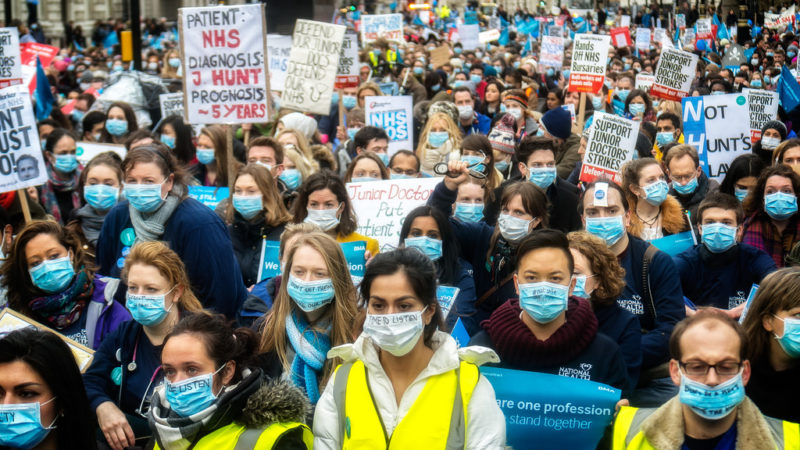While it might help, we aren't going to solve all our health service's problems just by pumping more money in.

The NHS is emerging from yet another mid-winter crisis bruised. The National Audit Office have lambasted the lack of investment in social care and community services to relieve the pressure on A&E departments – and a growing number of voices are pushing the idea of using new taxes to fill those funding shortfalls.
The Liberal Democrats’ February proposal for a “ring-fenced” tax is popular: an Observer poll found two-thirds of voters support the idea and are willing to pay an extra “penny in the pound” in income tax to fund it.
Then David Willetts, the Tory peer and former minister, chimed in this week to say he also wants a 15p income tax increase. Lord Willetts, though, wants the onus for his proposal to fall on the baby boomer generation who ‘own half the nation’s wealth’ instead of young people whose circumstances are precarious enough as is.
The health service clearly needs more money. But the current debate surrounding the crisis only focuses on funding, ignoring other critical problems that none of the parties will sole by throwing cash at them.
Even a well-funded NHS would still be hampered by slow, clunky structures. That’s to say nothing of the chronic breakdown in communication between GPs, hospitals, and local care services.
What will the Daily Mail say?
Flu season will come and go, but the NHS will still struggle to allocate beds, meet reasonable turnarounds and make sure patients have quality care. Patients suffer year-round from long delays and lack of space because of a deeper organisational crisis that isn’t bound to any one season.
Jeremy Hunt has a point when he says bureaucracy is slowing down the NHS and getting in the way of patient care, but his “anti-bureaucracy” drive hasn’t made healthcare any more responsive and “patient focused”. Instead, controversial prescriptions to streamline healthcare have been delayed, and healthcare practitioners complain about a chronic misunderstanding of the NHS at the Cabinet level.
One of the most glaring misunderstandings centres around funding cutting edge, often lifesaving medications. Those decisions are too often influenced by outside politics, as Hunt himself inadvertently revealed when he fought paying for pre-exposure prophylaxis (PrEP) proven to cut HIV infection rates. The Health Secretary asked simply: “What will the Daily Mail say?”
New treatments
Relying on the NHS for access to emerging treatments is often an ordeal for patients and families. The system of American patients resorting to crowdsourced healthcare isn’t supposed to apply here, and yet patients like nine year old Bethany Henry still find themselves begging strangers to help pay for the drugs that can literally save their lives.
Bethany suffers a genetic condition that causes tumours on her brain, kidney, and liver. The NHS refused to pay for the cancer drug Everolimus, which clinical trials showed would shrink her seizure-inducing tumours, because they were not cancerous and because too few people suffered from the disease to quality for “exceptional funding”.
The family started a petition to plead for Jeremy Hunt to intervene and a GoFundMe to pay for Bethany’s treatment. They even tried to sell their home. After the online campaign gathered 120,000 signatures, the NHS finally relented.
The Henry family isn’t an isolated case. Patients fighting spinal muscular atrophy (SMA), which rapidly limits the ability of children to move, swallow, and even breathe, are waiting for the NHS to make a funding decision on “miracle drug” Spinraza.
Whilst approved by the European Union, the US, and multiple European health services, many parents in the UK are being denied access to a medication that can halt deterioration and improve muscle strength. Some British parents have even been forced to take their young children abroad to receive treatment.
SMA patient groups and charities have lobbied the NHS to expand access to Spinraza and to speed up the review process, but the National Institute for Health and Care Excellence (NICE) took months to invite Spinraza’s manufacturer to submit the drug for appraisal. SMA patients’ health declines quickly without the treatment, making this slow burning authorisation process seem all the more cruel and heartless. This is not an issue of funding but of bureaucracy.
And then there is, as always, the Brexit factor. The NHS needs European doctors and nurses, and even a ring-fenced tax will not be able to fill the gaps left by the qualified personnel leaving the country or refusing to come.
The Lib Dem or Willetts plans may shore up one of the crumbling pillars of British health care, but the others still remain.
Jo Simmons is a writer and consultant currently living in London. She tweets here.
Left Foot Forward doesn't have the backing of big business or billionaires. We rely on the kind and generous support of ordinary people like you.
You can support hard-hitting journalism that holds the right to account, provides a forum for debate among progressives, and covers the stories the rest of the media ignore. Donate today.



